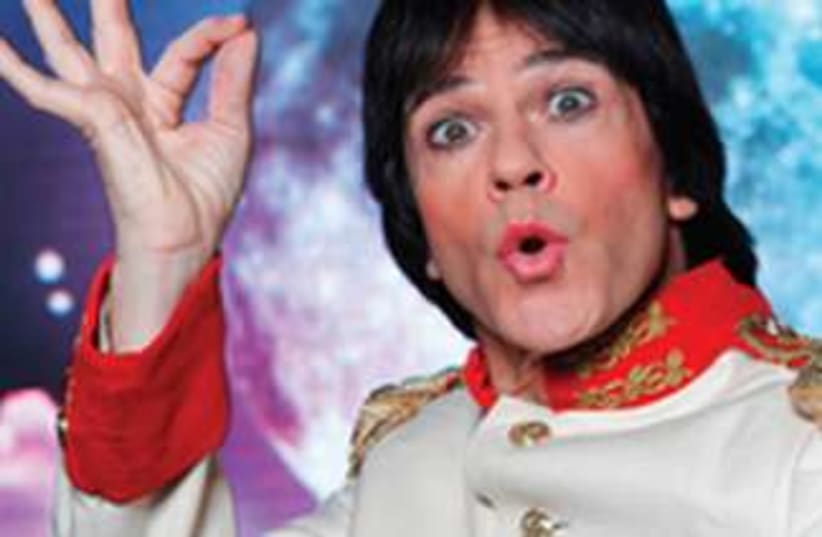Hanoch Rosenn – known as the prince of mime – has crisscrossed the globe with his silent speech shows and gangly, breathtaking movements. The late French Jewish mime superstar Marcel Marceau once said, “Mime, like music, knows neither borders nor nationalities.” Rosenn exemplifies this spirit.
He has captivated audiences not only in Israel but in Berlin, where he recently concluded a roughly three-week run of his new show Speechless. While he has performed elsewhere in Germany, this was his first show in Berlin.
“In this world of mime and visual movement you really depend on the imagination of the audience,” Rosenn says, adding that “there are not so many speechless performers. I have a gift. Why not use it?” With huge box-office success, the winner of the Academy Award for best picture this year, the largely silent film The Artist, showed the universal appeal of speechless performances. And Rosenn has played a key role in the revival of mime over the decades through his ability to modernize the field with video, sophisticated sketches, superb humor, and high-tech special effects.
Seated in the packed west Berlin café Literaturhaus, near the Berlin Jewish community center building, he explains the artistic and political significance of mime.
Asked about the staying power of mime, he says, “When I see a Charlie Chaplin film – and I am not putting myself on his level – I am still on the floor laughing. Silence has its powers.”
Speechless contains a brilliant sketch about a passenger meandering through the airport security system. While Israelis have long ago habituated themselves to robust airport security measures, the universal appeal of Rosenn’s scene resonates on all stages in the post 9/11 world.
Rosenn’s aim is to “push pressure points of laughter and sadness so the audience will identify with what I do without words… I do not want to say that I cover all of life’s spectrum,” says Rosenn. “My main points in life are childhood and Internationally acclaimed mime performer Hanoch Rosenn expands on his belief that ‘silence has its powers.’ Speechless in a Noisy World Theater Israel 2012 June 8 (PR) memories. The things you want to achieve, love and human nature.”
Asked what he thought the appeal of silence was, he answers, “We are so much surrounded by noise channels. It is just a noisy, verbal world. Silence has its powers.”
Some fans have been swept off their feet by Rosenn’s gestures, energy, and storytelling.
“He did everything to perfection...
that is what you call entertainment,” said one fan who has viewed the giants of musical theater, including Joel Grey in Cabaret and Yul Brynner in The King and I.
HOW DOES an Israeli growing up in Jerusalem during the 1960s and 1970s find his way to a profession that had passed the introduction of “talkies”? “I studied some pantomime at the Jerusalem youth stage. We studied acting with Joseph Mundi,” says Rosenn. Amos Arbel, the television reporter, exposed him to pantomime and he learned the “basics of mime” from the distinguished French mime instructor Étienne Decroux (1898- 1991). Marcel Marceau trained with Decroux.
Rosenn says one of his “eureka moments” was viewing the Tel Avivborn mime Samy Molcho, who had relocated to Vienna and returned to Israel. “He came for one day to Jerusalem and performed,” says Rosenn, adding that “after one year I performed together with him.”
In fact, Rosenn did his three years of IDF service as a pantomime performer. He says with a smile, “Everybody gives what he can.”
During his IDF service, Rosenn was appointed director of all entertainment for Israeli troops, and also did choreography.
Rosenn conveys a playful mischievousness that pleasantly rattles spectators. He darts around the stage and theater in marathonlike style that mesmerizes for the entire duration of the roughly twohour Speechless show.
There are “a few kids who are afraid because I do not speak,” he relays. His wife, a therapist who he says, “has the talent of speaking with people,” was riding in a taxi in Jerusalem once. The cab driver told her he had no fears, with one exception: as a young boy he had been scared of Rosenn’s lack of speech during his performance. Nonetheless, his shows are embraced by children and adolescents.
When asked if he had experienced anti-Semitism during his international tours, he says, “not really. It is not something that is direct.”
He is, for example, asked questions about Israel such as “why are we so cruel? I am not right-wing at all, but I often find myself defending the government because the European perception of the Arab-Israeli conflict seems far from objective,” he says.
“As much as Foreign Minister Avigdor Lieberman is controversial, he understands the need to promote artists to show the ‘good aspects of Israel,” notes Rosenn. He cited Lieberman’s efforts to expand Israel’s presence in small countries. In 2010, Rosenn performed in El Salvador at the time IDF naval commandos intercepted a flotilla of ships attempting to break Israel’s blockade of the Hamascontrolled Gaza strip. The seizure of the Turkish vessel Mavi Marmara resulted in the deaths of nine terrorists, triggering international outrage.
While the global press, and Europe, was fixated on the Mavi Marmara, the press conference in El Salvador with Israel’s Ambassador Mattanya Cohen focused “90 percent on the show and 10% on the conflict in the Mediterranean Sea,” notes Rosenn.
“The Foreign Ministry should use Israel’s artists and painters as a way to fight preconceptions of us as a fighting people like the Spartans,” he says. “We have much more than the army. We have art! We are seven million people with so many shows in the entertainment sector,” he adds.
Wittingly and unwittingly, Rosenn’s performance carves out new territory in the world of human communication and packed emotions. Speechless is not just speechless.
The writer is a research fellow at the Foundation for the Defense of Democracies and the European correspondent of The Jerusalem Post.
